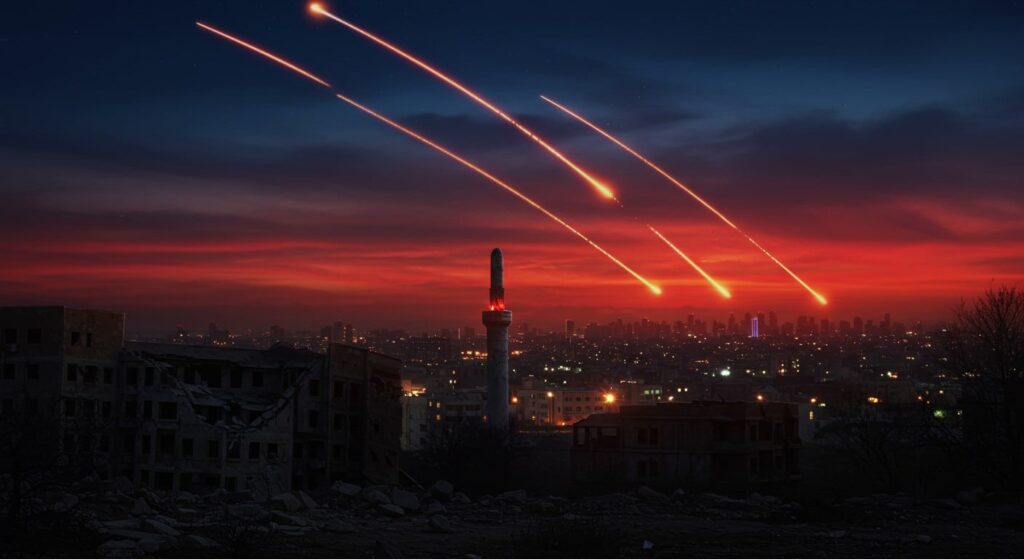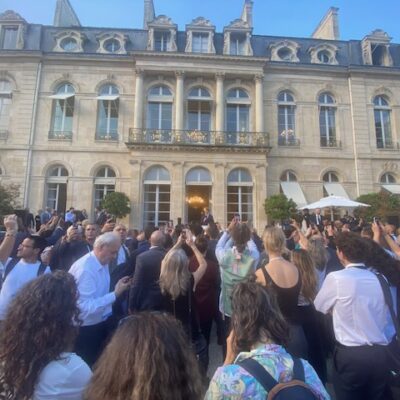Article written before the bombing carried out by American aircraft on Iranian nuclear sites and therefore before the ceasefire.
In our previous newsletter, I wrote that the week of June 9 could mark a turning point in Middle Eastern affairs. I was referring to two events: the vote in the Knesset on the law exempting the ultra-Orthodox from military service, and the meeting organized by the Élysée Palace on June 13 in Paris, which brought together several hundred representatives from Israeli and Palestinian civil society organizations to prepare for the peace conference scheduled in New York on June 17 at the initiative of France and Saudi Arabia.
And as is often the case in the Middle East, it was another event that came to upend the region. Let’s go back over how events unfolded.
In the Knesset, as expected, the ruling coalition voted against the dissolution of parliament requested by the opposition, thereby securing a six-month reprieve for the government, since no further dissolution motion can be submitted during this period. As for the ultra-Orthodox, they will be able to continue ignoring army summonses with near impunity while awaiting a potential agreement with the ruling coalition to secure their exemption.
In Paris, on Friday, June 13, the hundreds of representatives from Israeli and Palestinian NGOs, who had arrived the day before, awoke to the news that Israeli aircraft had begun bombing sites in Iran, leading to the closure of air communications and making their return—planned for the next day—highly uncertain. Despite this tense atmosphere, the meeting at the CESE (Economic, Social, and Environmental Council) went ahead. Throughout the day, we participated in discussions, which were often emotional reunions among activists committed to ending the conflict and imagining a different future for themselves and their children. These exchanges resulted in a joint call for a two-state solution, which was presented to Jean-Noël Barrot, the Minister of Foreign Affairs, who closed the meeting in place of President Macron, who was held up by an emergency press conference due to unfolding events.
We were then taken by bus to the Elysee Palace to attend this press conference, after which the President joined us on the garden lawn. Surrounded by all these activists—many taking selfies with him—the President warmly thanked us for our efforts toward peace and reiterated his commitment that France will recognize the State of Palestine as part of a regional agreement to end the war in Gaza, free the hostages, and establish a governance and reconstruction mechanism for Gaza without Hamas.
The next day, the program was upended. The Palestinian delegates rushed home via Amman, as they had arrived, leaving the Israeli participants—both Jewish and Arab—to take part in the scheduled workshops aimed at preparing a civil society action plan. A few Israelis accompanied the Palestinians and managed to return to Israel via the Aqaba border. They witnessed the Jordanian air force intercepting Iranian missiles and drones before they could reach Israeli soil, just as it had done during previous attacks. This was yet another reminder of the foresight shown by King Hussein and Yitzhak Rabin in signing a peace treaty between their two nations, following Egypt’s lead, and opening the door to a different future for the Middle East.
Then began an odyssey for the remaining Israeli participants to get back home—some through Larnaca, others through Sharm el-Sheikh—joining the hundreds of thousands of their fellow citizens stranded abroad.
Now to the new war with Iran, long feared for years. One may question whether Iran was truly on the verge of producing a nuclear weapon. But its refusal to cooperate with the IAEA (International Atomic Energy Agency) to allow inspections of its facilities, combined with the recent acceleration in uranium enrichment reported by UN experts, were valid grounds for Israel’s concern—Israel having monitored Iran’s nuclear program closely for years. The recent weakening or elimination of the regime’s proxies—Hezbollah, Hamas, the Houthis, and Syria—and the significant reduction of Iran’s anti-aircraft defense due to recent attacks, opened a window of opportunity for the IDF to strike at Iranian missile launch bases and nuclear facilities.
The swift early successes, along with the elimination of several military leaders and nuclear experts, demonstrated the high level of preparation by Israeli forces and their penetration into Iranian security services. Despite 25 deaths and hundreds wounded—as of this writing—and massive destruction in Israel caused by ballistic missiles that could not be intercepted, the israeli public and the opposition support the government in this war, hoping it will eliminate, or at least postpone, the Iranian threat for years to come.
Despite these victories—admired by military and intelligence experts abroad—we must not forget, as Yaïr Golan, the leader of the Democratic Party, reserve general and former vice chief of staff, wrote in Haaretz on June 18, that the objective of this war is not “to eliminate the ayatollahs’ regime or to force it to surrender,” but to weaken it enough to bring about “a new nuclear deal, better than the JCPOA (Joint Comprehensive Plan of Action—Vienna Agreement of July 14, 2015), but based on it, and ensuring stricter and longer-term oversight of Iran’s nuclear capabilities.”
Yet, as in Gaza, Netanyahu’s government has no exit strategy for this new war. It hopes to draw in the United States, the only country potentially capable of destroying the deeply buried nuclear facilities under Fordow mountain. While President Trump seems hesitant about what course to take, we must remember the lesson from recent wars—from Afghanistan to Iraq and Libya: regimes do not fall through external intervention. They collapse only when internal opposition forces are strong enough to seize power.
Even if this war has unified the Israeli public behind its government, it does not erase that government’s responsibility for the October 7 failure, the ongoing and unresolved war in Gaza, its abandonment of the hostages, the deep divisions it fosters in Israeli society through attempts to impose a judicial overhaul that amounts to a regime change, or the deterioration of Israel’s position on the international stage.
Israel must avoid the mistakes of the past—believing that military successes, however impressive, grant it the right to impose certain leaders’ will on its neighbors. As Yaïr Golan also wrote, “any victory that does not result in an agreement is doomed to devolve into another war.” Israel must use its successes to build regional agreements that ensure stability and security for all countries in the region. And these must necessarily include a resolution of the Palestinian conflict.
David Chemla







